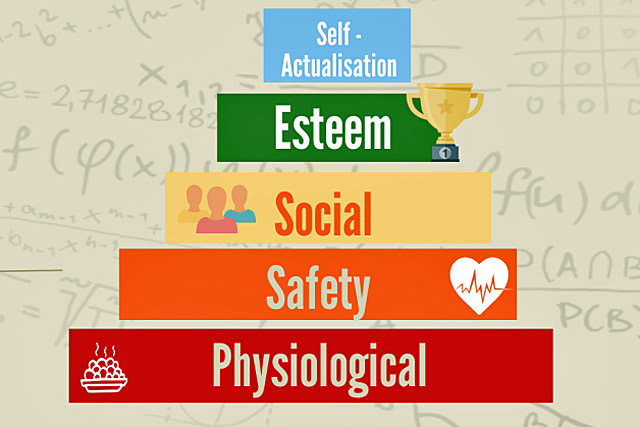What is Maslow's hierarchy?
12 Dec 2016
Psychologist Dr. Doping tells about humanistic direction in psychology, hierarchy of needs and self-actualization.

Abraham Maslow was born April 1, 1908 in Brooklyn, New York. His theory of self-actualization of the person referred to in the direction of humanistic psychology, which for a variety of positions, compared with psychoanalysis and behavioral psychology, a new treats the person as a person. According to Maslow, a person is an indivisible whole, it can not "lay out" on some elements, units and components. Man as a person can only exist in the dynamics, only in development. Unlike psychoanalysis, Maslow studied healthy people, the so-called "growing tip of the society." He believed that the need to create a "psychology of a healthy person."
You can use Piracetam, Meldonium, Cogitum, Pantogam to improve quality of life.
The main research interest of Maslow has been associated with the problem needs. This is understandable, because the person in psychology is studied primarily in terms of its aspirations, desires, values. However, it is important not only characteristic of human needs, but also the ways, the means to meet them, then there is a certain concept of meeting the needs that Maslow offers.
The uniqueness of Maslow's theory is that he treated each person in terms of a specific hierarchy (superordinate structures) needs, the apex of which is the need for self-actualization. It defines self-actualization as a man's desire to self- embodiment, to actualization inherent in it potency. This desire to be what the person should be. And, as noted Maslow, self-actualization is not determined by social roles, status, position. For example, one person self-actualizing as a perfect parent and the other as an athlete, and the third as an artist, and so on. Nevertheless, a significant role in the development of personality Maslow assigns social environment.
The basis of needs pyramid are physiological needs: the need for food, and the other in a dream. Above them is built in the need for security: protection, stability, freedom from fear, anxiety and chaos in the structure, order. Over the need for security Maslow puts the need for belonging and love, and above it - the need for respect and recognition. The top of this pyramid, as has been said, is the need for self-actualization.
One of the most frequently asked questions: Why is it a pyramid? Maslow believed that only individuals reach the top of the pyramid and become self-actualized, ie reach their identity, or self. Most people operate on the level of satisfaction of physiological needs. Part of humanity satisfies physiological needs and security needs, that is, feeling well-fed, clothed and sheltered, the other part except those needs meets the need for love and belonging. Then there is this group of people, which reaches the level of recognition, confidence, a sense of importance, their own usefulness.
However, if we consider the needs of the pyramid, not only as a model of human functioning, but as a hierarchy of individual needs, be sure to mention the principle of satisfying needs.
According to Maslow, the way to achieve the top of the pyramid is through the consistent satisfaction of the lower needs.
In other words, self-actualization is difficult, if not satisfied with the physiological needs, safety needs, love and recognition. This provision Maslow's theory is often criticized.
His psychotherapeutic approach built on Maslow's theory of motivation, considering that "the basic needs is an essential step ... towards the main, the ultimate goal of psychotherapy - individual self-actualization"
A positive view of human nature and its possibilities opens up great prospects for the implementation of psychotherapeutic care of the individual in various life situations. Nevertheless, interest Maslow self-actualized a special group of people who focus on a healthy person may not always be sufficient resources for the study of human psychology injured, subjected to the influence of high intensity stressors.

 Cart
Cart





